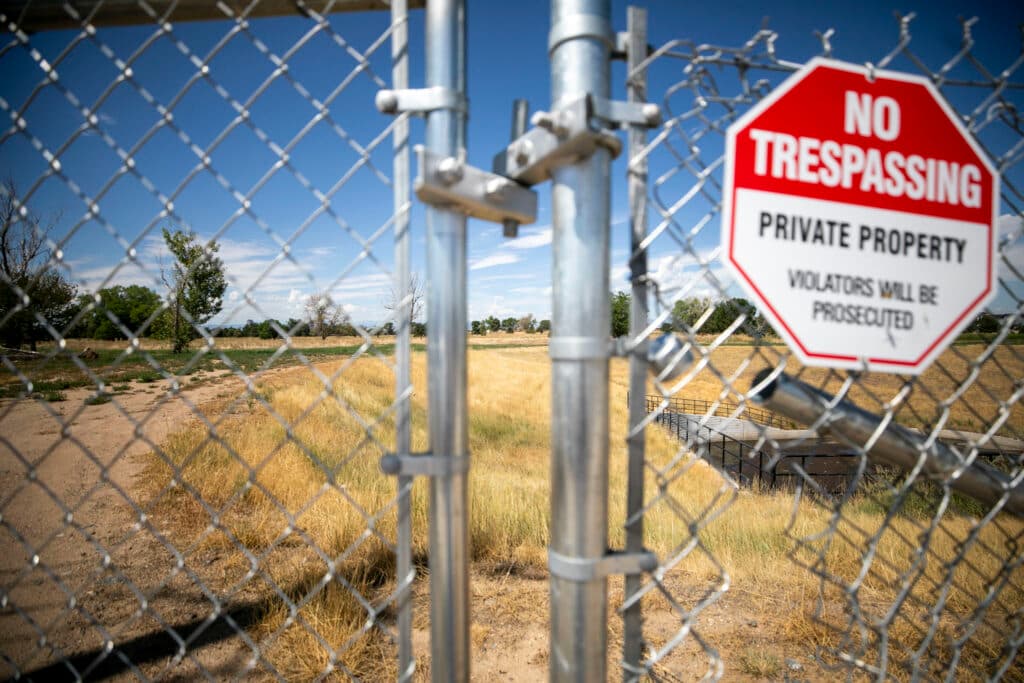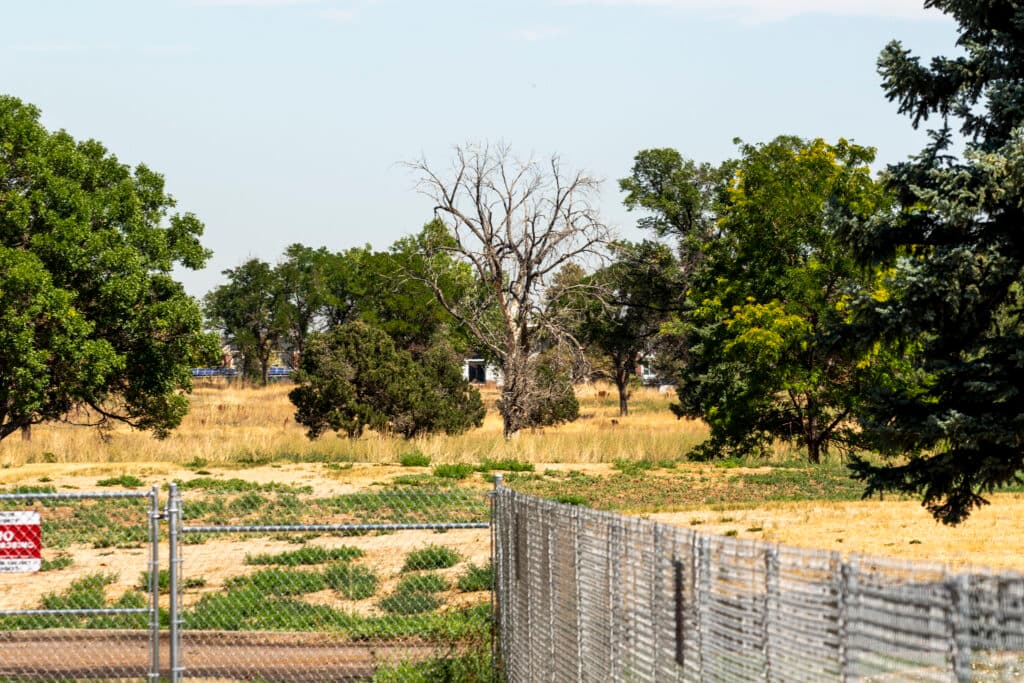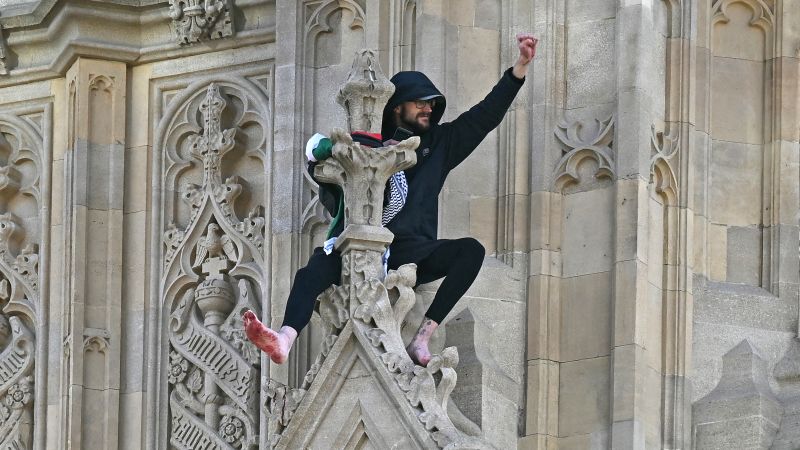A deal on Denver’s defunct Park Hill Golf Course is coming. So what’s next?

The Park Hill Golf Course is closed, fenced off and yellowing. Aug. 6, 2024.
Kevin J. Beaty/Denverite
Years of arguments over the closed Park Hill Golf Course in Northeast Park Hill may come to a head soon. Earlier this week, Mayor Mike Johnston said a forthcoming deal between the city and the property owners could bring new life to the course.
Westside bought the course for $24 million in 2019, hoping to turn it into a major mixed-use development. But the effort was shut down by a public vote in 2023.
The course has been shuttered ever since. Right now, “golf course” is a nostalgic term for the property — a fenced-off sprawl of dry grass, sad trees and “No Trespassing” signs along Colorado Boulevard. Five acres even caught fire.
The mayor has been promising action on the course for nearly a year. On Monday, he said negotiations could wrap up this month.
“We’re excited about the progress,” he said. “We’ll have news coming in the next week or two.”
When Denverite asked what the city would actually do with the land, Johnston said he feared his staff would kick him under the table to keep him from spilling the beans.
But the head of Westside Investment Partners, Andy Klein, told CBS the deal would be a land swap for a city parcel near Denver International Airport. In the potential deal, the city would take over the 155-acre golf course for public purposes. Meanwhile, Westside could develop its new land near the airport.
Westside did not immediately respond to a request for comment from Denverite.
So what could happen with the land?
In 2023, Johnston toured the land with Denverite and shared his aspirations to acquire the former golf course and turn it into a park after voters rejected the development. On his first day in office, he pledged to strike a deal with the property owner.
A city purchase could open a new debate about whether or not to reopen the golf course. According to the conservation easement, the city needs to make it a regulation-length, 18-hole golf course — as long as that’s feasible.
The city runs the nearby City Park Golf Course, a facility often overflowing with reservations.

But Johnston and the surrounding community also have shared a lot of ideas beyond golf.
Before he was elected, Johnston imagined a skate park, a ski facility, a fishing pond and a skating rink as possibilities.
“I think there are certainly creative landscape architects and creative residents who give us good ideas for what to do with this space,” he said at the time.
Neighbors have proposed their own ideas: basketball courts, a sports stadium, urban gardens, a dog park and urban trails.
Can the city afford any of this in a tight budget year? Will residents and Johnston agree on future land use? Would any plan beyond golf, likely exceeding the terms of the conservation easement, require yet another vote of the people?
All this is yet to be determined.
Meanwhile, the “No Trespassing” signs stay up. The land goes unused. And Westside’s threats of prosecution linger for anybody who dares to go for a walk.
How did we get here?
Over decades, the 155 acres have served as a dairy farm worked by orphans, a golf course, a place where Tiger Woods could teach the sport to kids in the largely Black neighborhood, and a dream site for various types of development.
Most commercial development attempts have been beaten back since at least the 1960s, though some of the golf course land has been used for housing.
Westside first proposed developing the land soon after buying it in 2019. A group of residents led by former Mayor Wellington Webb objected, saying they wanted to save open space.

They cited a 1997 conservation easement that mandated the land be used as an 18-hole, regulation-length golf course for as long as that was feasible. Attorneys also claimed the easement would still allow the land to be used as a park, recreation or open space.
Neighbors weighed in and made a community benefits agreement with the developer. The developers promised to fund the fourth largest public park in the city on the site, along with thousands of units of housing, retail and a potential – but not guaranteed – grocery store.
During the pandemic, Westside kept the defunct golf course open, and neighbors grew accustomed to walking their dogs there. Still, it wasn’t a park.
The promises of benefits for the neighborhood and housing that would lower costs were dismissed by open space advocates as cash grabs by the developer. Ultimately, voters rejected Westside’s plans.
Many critics said they were acting in the name of protecting public open space. Until now, that has never been an actual use of the land. But that could soon change.
Related
5 Things I Never Play Golf Without: David Dusek
Our 11-handicap equipment writer always brings his favorite divot repair tool, a portable speaker and some high-tech gear to the course.As long as the weather i
Donald Trump’s golf course wrecked by pro-Palestine protesters
Pro-Palestinian protesters have vandalized parts of U.S. President Donald Trump's golf course in Scotland in response to his proposal for the reconstruction of
Man holding Palestinian flag scales London’s Big Ben hours after…
CNN — Emergency services were called to London’s Palace of Westminster on Saturday a
EPD: Drunk driver parked car on golf course
EVANSVILLE, Ind. (WFIE) - Evansville police say they arrested a man after finding him drunk in his car that was parked on a golf course.Officers say they were c











